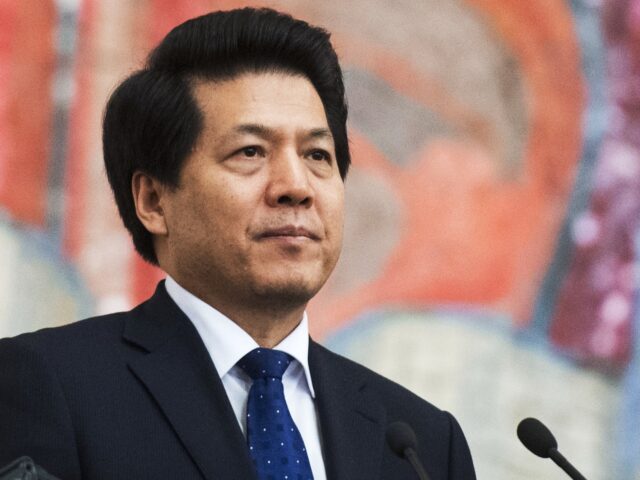The Communist Party of China confirmed that a delegation led by former ambassador to Moscow Li Hui would begin a tour on Monday of several European states, including Ukraine and Russia, in an attempt to galvanize “peace talks” between Kyiv and its Russian invaders.
China announced that it would send such a delegation shortly after genocidal communist dictator Xi Jinping held a phone call with Ukrainian President Volodymyr Zelensky in April, the first top-level communication between the two countries since Russia announced a “special operation” to oust Zelensky in February 2022. China is one of Russia’s closest geopolitical allies and Xi visited Moscow in March before agreeing to converse with Zelensky.
While enjoying friendly ties to Russia, Beijing insists it is impartial regarding Russia’s invasion of Ukraine and has long maintained amicable ties to Kyiv. Zelensky spent much of the past year asking Xi to speak to him and inviting Chinese companies to rebuild the parts of his country destroyed by the invasion following its conclusion. Ukraine is also a member of the Belt and Road Initiative (BRI), China’s global debt-trap infrastructure program, and depends heavily on China for its global trade.
The Chinese Foreign Ministry confirmed on Friday that Li and his team would begin their travels on Monday, without clarifying if that meant that they would leave China on Monday or arrive at their destinations then. The Foreign Ministry has also not clarified the order in which the delegation is scheduled to visit the countries on its itinerary.
“Starting from May 15, Special Representative of the Chinese Government on Eurasian Affairs Li Hui will travel to Ukraine, Poland, France, Germany and Russia for communication on a political settlement of the Ukraine crisis,” Foreign Ministry spokesman Wang Wenbin told reporters on Friday. “This upcoming visit by the Chinese representative again reflects China’s commitment to promoting peace talks and staying on the side of peace.”
Wang promoted the Chinese government’s “Political Settlement” document laying out what Beijing calls a peace plan for the country. The Communist Party published the document in February, the anniversary of the Russian “special operation,” which offers such advice for the countries as a request that Ukraine and Russia “calm down as soon as possible.”
“Dialogue and negotiation are the only viable solution to the Ukraine crisis. All efforts conducive to the peaceful settlement of the crisis must be encouraged and supported,” the paper stated, without offering specifics on those efforts. Neither Ukraine nor Russia has expressed any authentic interest in the Chinese “plan,” though the Kremlin described China has having “impressive potential for mediation” in April.
“President Xi Jinping has put forward four principles, called for joint efforts in four areas and shared three observations on Ukraine, which outline China’s fundamental approach to the issue,” Wang said on Friday. “On this basis, China released its Position on the Political Settlement of the Ukraine Crisis, which reflects the above core ideas of China’s stance and takes into account the legitimate concerns of all parties, and has thus received extensive understanding and recognition from the international community.”
Wang, hosting another regular press briefing on Monday, offered no specifics on where, exactly, Li Hui and his delegation are going.
“We have provided information a few days ago on Special Representative of the Chinese Government on Eurasian Affairs, Ambassador Li Hui’s visit to Ukraine, Poland, France, Germany and Russia,” Wang told reporters. “We will share more about the visit in due course. Please check back for updates. China will continue to work with the rest of the world to play a constructive role in the political settlement of the Ukraine crisis.”
The Li Hui delegation’s European tour is a direct result of talks between Zelensky and Xi last month that the Ukrainian president called “long and meaningful.”
“I believe that this call, as well as the appointment of Ukraine’s ambassador to China, will give a powerful impetus to the development of our bilateral relations,” Zelensky said at the time.
Chinese state media reported that Xi told his Ukrainian counterpart that China had a “consistent and clear” desire to develop ties with Ukraine and supported “mutual respect for sovereignty and territorial integrity,” a phrase Beijing typically uses to coerce other states to support its colonialist claims over the neighboring country of Taiwan.
Xi spoke to Zelensky following public pressure from the White House for China to reach out to its economic partner Ukraine, as well as reports that other pro-Ukrainian Western nations also hoped to increase communist China’s profile in the dispute. In April, Bloomberg News, citing anonymous “sources,” claimed that French President Emmanuel Macron had concocted a “secret plan” to bring China to the Russian invasion negotiation table after visiting China this year.
While the Chinese government insisted its communications with Kyiv were intended to reach a “political settlement” with Russia, Moscow responded to the Zelensky call by dismissing any attempts at ending the invasion.
“The Ukrainian authorities and their Western minders have already shown their ability to mess up any peace initiatives,” the Russian Foreign Ministry said in a statement after the presidents’ phone call.
The Russian state outlet Sputnik claimed on Monday that Li’s “first stop” would be in Ukraine.
If so, it is unclear who he would be meeting with in Kyiv. Zelensky is currently on a surprise visit to the United Kingdom, meeting with Prime Minister Rishi Sunak.
Sunak reportedly said before the meeting that London was expecting to negotiate with Zelensky to give Ukraine more “attack drones” to use against the Russians “deep behind enemy lines and disrupt Russian supply lines and logistic hubs.”
Zelensky arrived in the United Kingdom after stops in Italy, Germany, and Vatican City over the weekend.

COMMENTS
Please let us know if you're having issues with commenting.